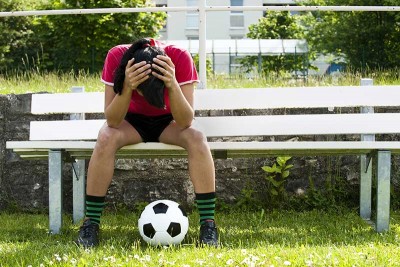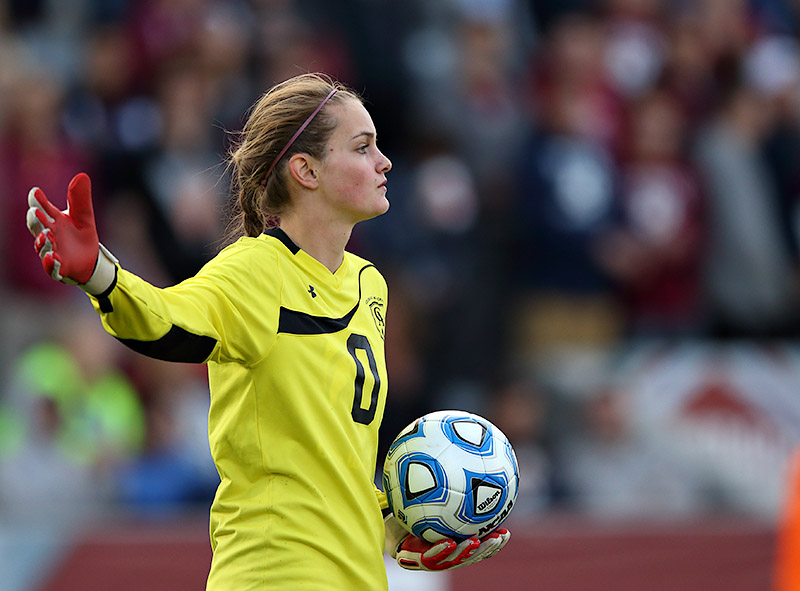Zuriel Lozano
Mentally ready to be a goalkeeper?
Over the last several years, I’ve had the privilege to have trained hundreds of goalkeepers worldwide and I have been able to study and analyze many of these keepers in order to understand their mental preparation. It will take me many years trying to explain what happens inside of the athlete’s mind but hopefully this blog will give you SOME ideas of the situations that many goalkeepers go through mentally or maybe you know someone who you can relate regarding this subject.
The mental part of a goalkeeper is the most neglected area among thousands of youth/amateur goalkeepers. Despite of all the great consistent training and soccer experiences, some goalkeepers continue to struggle, generally this means their MENTAL game requires some attention.
Think about the goalkeeper who is so afraid to make a mistakes out of fear to disappoint a parent, team or coach. I have also encounter many young amateur goalkeepers who will ONLY perform extremely well under known comfortable conditions such as a familiar team, great defense, coach, age group & even different club. In addition, these young goalkeepers tend to make LOTS of excuses and blame everybody else for their mistakes or always try to get the easy way out of unknown situations!!
This is the most devastating example, the goalkeeper who is playing ONLY because he wants to PLEASE somebody such as mom, dad, coach or teammates. Generally these kids will STOP playing soccer completely before they turn 17.
However, these are NOT a sign of weakness or serious problem. Often time this has to do with the MATURITY level of the goalkeeper. But also parents and coaches could be a BIG factor on their athletic mental growth of the Goalkeeper.
Note: Depression is a more specific and serious problem that will require medical attention.
Here are few things to help you with your mental game:
Goalkeepers:
Think about this, playing in youth clubs is really a great place to grow in soccer. You get to play with friends and compete generally with players around your same age group and everything is going your way.
However, this WILL change when you play in High school or even try to get a starting spot in COLLEGE where you will be competing with much older keepers in college, will you simply shy away from competition? what if you don’t get the starting spot, are you going to hate playing & complaint why you are not starting? Here’s where GROWING UP begins!!
What if you are a College goalkeeper, but you are just waiting for the Senior goalkeeper to graduate to get a chance but you still have to compete with 3 other goalkeepers ahead of you. are you going to quit simply because your whole career you where the starting goalkeeper in your club? You mind set MUST be different to succeed!!!
While you are in your club, learn to enjoy your amateur career. However, learn to be OK being out of your comfort ZONE. Don’t be afraid to take challenges and learn new ideas. It is ok to make mistakes and learn from these mistakes. Remember, you are not trying to be perfect goalkeeper, you want to be an efficient and consistent goalkeeper.
Find ways to train, not just on basic concepts of goalkeeping but all aspect from top corner saves to Penalties. Be physically and mentally strong by studying formations, tactics, ideas, improve your fitness & power, but also REST. Find ways to be a powerful influence in your team & you will be performing very well in every game despite of what team you play for.
This is very important:
Be HONEST TO YOURSELF. If you are not getting a spot in a top team or you’re not getting a call from a certain college team it could be for a millions different reason. Perhaps you are you are slow, can’t do goal-kicks, no vertical jump or the coach has his preference, it could be ANYTHING. However, you KNOW EXACTLY the reason so be honest and reach DEEP to confront this adversity. It requires MENTAL TOUGHNESS & honesty to overcome this obstacle.
Parents:
Being a consistent goalkeeper does NOT mean a perfect goalkeeper. THERE IS NO SUCH OF THING CALLED PERFECT GOALKEEPER, ONLY PERFECT EFFORT.
Soccer is a game of mistakes, it is a fact. However, it does not matter if your child train 7 days a week for 3 hours a day and train with the best coaches or programs, if your child is always afraid to makes mistakes or is always looking over his shoulder worried that his parents saw him MESS UP, This WILL CRIPPLE his confidence, he may never gain this back.
Sometimes, when amateur goalkeepers are under a lots of psychological stress, kids tend to give you very little effort in training and matches. They just do well enough to get finish what they are doing.
Furthermore, there are goalkeepers who are NOT made to compete and that’s ok. However, you must recognize if it is YOU (parent) the one who wants child to compete more than the child does. There’s nothing wrong with having a kid playing soccer at a different level so he can enjoy his soccer experience.
Here’s a last tip:
If you want your child to be the next HOPE SOLO or TIM HOWARD and play for the US national team and/or play for a Division I University but your child is now 14 yrs old and is NOT able to do specific things such as confident dives, catches, execute decent goal-kicks, accurate punts or be well skilled with the ball at their feet then this does NOT mean that your child cannot reach her/his goal, it means that your child must be MENTALLY EQUIPPED to encounter HUGE challenges ahead.
Final thoughts:
As Parents we want to protect our children from disappointments, pain & suffering. However, overprotecting kids will destroy their confidence & will make it DIFFICULT for any goalkeeper to deal with adversities. If they cannot deal with adversities, they will NOT put as much as effort and look for every excuse to go do something that’s is less stressful. They will simply give up, which is the easy way out!!!
They are your sons and daughters FIRST, athletics come second. If your child has a CAREER ENDING INJURY then what’s going to happen to your child mentally? how will you and your child handle this adversity? think about it!!
As a goalkeeper, If you are looking to play professionally, then know that if you are not able to perform and win games at the professional level, you will be CUT and sometimes OUT OF A JOB. The Pro’s is a business!!!. so if you are looking to be a higher level player, you MUST BE MENTALLY EQUIPPED to meet the highest standard and demands.
On the other hand, if you are a parent with an athlete who seems to have a “natural” talent for the the goalkeeping position then the job is NOT over. There are a number of things that can be done to ensure this goalkeeper reaches his/her FULLEST potential.
At the College level you will be surrounded by athletes that only want a starting spot. College coaches have NO TIME to develop players so your mind set must be different.
So learn to deal with adversity in a way that it is helpful to your career. Once you learn how to deal with these problems, instead of getting the EASY WAY OUT, then you are mentally equipped to encounter ANY situation in life or even in a game.
Do you struggle with your mental game? or do you know someone who does?
More to explorer
Soccer parents, are you exhausted?
You seem to be living your life according to youth club soccer. An intense emotional roller coaster is experienced by parents throughout the United States as their children progress through their youth soccer careers. You may not think so, but being a youth soccer parent is exhausting emotionally and physically. Many parents have developed serious
Who stresses more during games parents or athletes?
Nervous soccer parents

Understanding Athlete Burnout
Athlete burnout is defined by Sport Psychologists as: physical/emotional exhaustion, sport devaluation, reduced athletic performance and accomplishment”. Burnout can happen at a very young age. I have personally met many 12-year-olds who show severe signs of burnout. Unfortunately, a number of parents refuse to believe their children are too young to burn out, insisting that what their children require is
